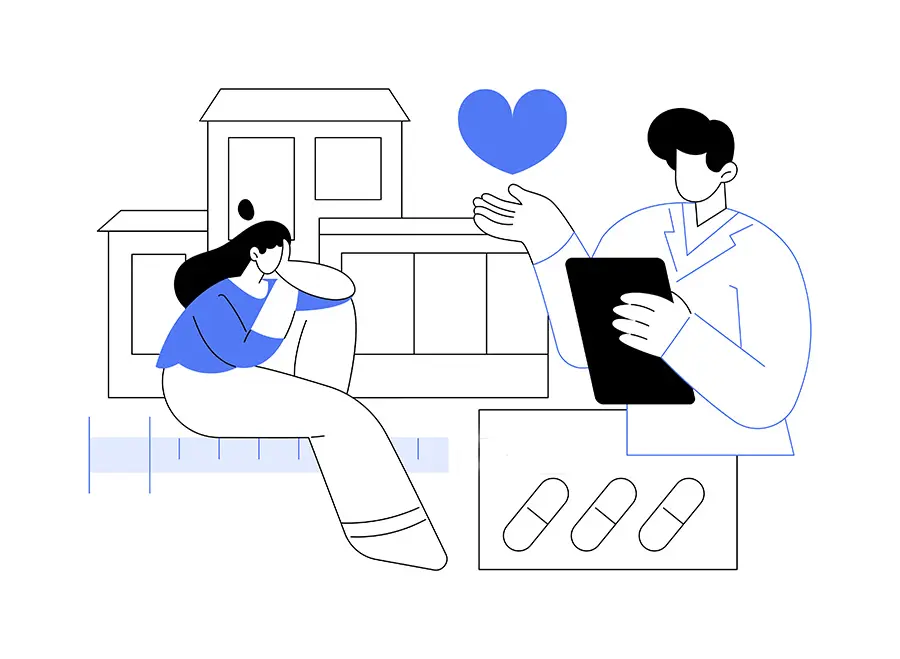As telehealth services, including online addiction treatment services, have become more common, many insurance plans have begun to include online rehab as part of their addiction treatment coverage. While most insurance providers are required to offer some form of addiction treatment, they are not required to offer it in the form of telehealth services. However, some sort of online addiction treatment insurance is available with most insurance plans.
The extent of this coverage varies depending on the specific insurance plan and the addiction treatment in question. Understanding what type of coverage is required for your insurance plan to offer, and what specific coverage is offered in your specific plan, are the first steps towards getting the help you need.
According to the law, health insurance companies cannot deny coverage for addiction treatment. Health insurance companies also cannot charge higher premiums based on pre-existing substance use disorders. Substance abuse treatment is considered an essential health benefit (EHB) under the Affordable Care Act (ACA). The ACA was passed in 2014 and applies to health insurance plans sold through the Marketplace, Medicaid, Medicare and employer-sponsored plans.
Under the ACA, health insurance for addiction treatment must include the following services:
Many of the addiction treatment services mandated by the ACA can be offered online. However, health insurance companies are not mandated to offer them as telehealth services, although many of them do.
Health insurance plans included in the ACA have to provide medications for addiction as part of their substance abuse treatment services, but the extent of coverage can vary. Medications used in addiction treatment that are usually covered by insurance include:
Insurance plans may also require that medication-assisted treatment be combined with counseling or behavioral therapy for coverage to apply. Be sure to discuss all treatment options with your healthcare provider and insurance company to ensure you’re receiving the best possible care and coverage available with your plan.
To check what’s covered by your current insurance, start by reviewing your policy’s details carefully, either by yourself or with an insurance provider representative. Many policies have specific sections dedicated to substance abuse treatment, mental health services, and behavioral health coverage, which might help quickly orient you to the details you need.
If speaking with an insurance provider representative, you can ask about coverage for specific types of addiction treatment, which might include treatments like:
Be sure to ask about deductibles, copays, or coinsurance you may be responsible for, as well as any limitations or exclusions on the number of treatment days or visits covered.
In addition to familiarizing yourself with your own insurance plan options, facilities offering addiction treatment programs that accept your insurance can advise on how to get the most out of your coverage. This is particularly useful if you are looking for an online rehab program, as you can search for a provider that specializes in telehealth, like Eleanor Health.
At Eleanor Health, we work with most major insurance plans across the US to provide affordable care to our members. We offer virtual, hybrid and in-person treatment services for alcohol and opioid use disorder. Our insurance partners include:
If your insurance is not on the list, we can help you get treatment using out-of-network benefits offered by your plan. If you are concerned about out of pocket costs, we offer 0% interest payment plans that allow you to get the treatment you need without worrying about the cost.
In some cases, individuals may have access to multiple insurance providers, such as a primary health insurance plan through an employer and a secondary plan through a spouse or parent. In these situations, it’s possible to coordinate benefits between the two plans to maximize coverage for addiction treatment services.
The process is known as “coordination of benefits” or “COB.” It involves determining which plan is considered the primary payer and which is the secondary payer for each medical claim.
Generally, the primary payer is responsible for covering the majority of the costs, while the secondary payer may cover any remaining eligible expenses, up to the limits of their plan. This can help reduce out-of-pocket costs.
It’s important to inform both insurance providers about any other coverage you have and follow their specific procedures for coordinating benefits. This often involves submitting claims to the primary payer first and then submitting any remaining eligible expenses to the secondary payer.
While having health insurance can significantly reduce the financial burden of online addiction treatment, some individuals may find themselves in a situation where they need to seek treatment without insurance coverage. In such cases, there are still options available:
At Eleanor Health, we believe you deserve to get the care you need without worrying about the cost. That’s why we accept most major insurance plans, and work with our members to make the most of their coverage, whether we have a prior agreement with your insurance company or not. In addition, we have flexible payment options that allow members to begin their recovery journey without damaging their finances.
 Virtual Addiction Treatment: is it as Effective as In-Person Treatment?
Virtual Addiction Treatment: is it as Effective as In-Person Treatment?
 Detoxing from Opioids: How to Do it Safely
Detoxing from Opioids: How to Do it Safely
 Addiction Treatment: Fact vs. Fiction [E-Book]
Addiction Treatment: Fact vs. Fiction [E-Book]